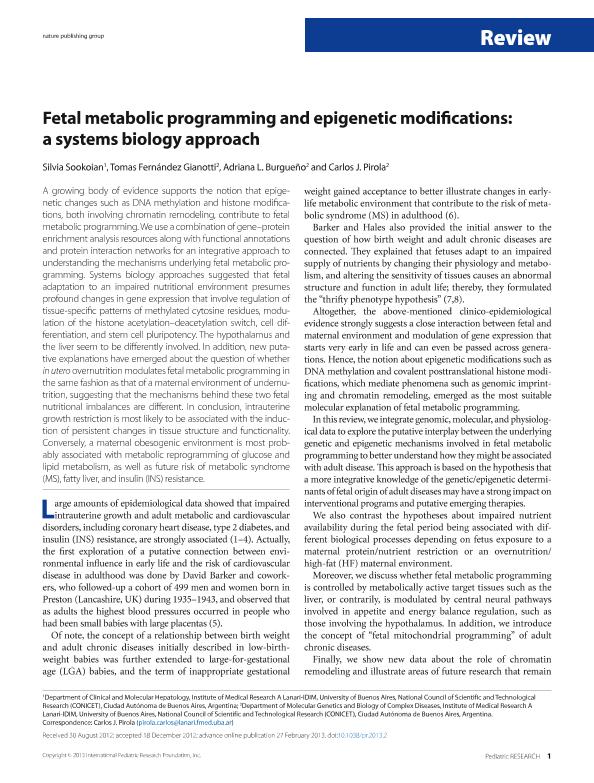Artículo
Fetal metabolic programming and epigenetic modifications: a systems biology approach
Sookoian, Silvia Cristina ; Fernandez Gianotti, Tomas
; Fernandez Gianotti, Tomas ; Burgueño, Adriana Laura
; Burgueño, Adriana Laura ; Pirola, Carlos Jose
; Pirola, Carlos Jose
 ; Fernandez Gianotti, Tomas
; Fernandez Gianotti, Tomas ; Burgueño, Adriana Laura
; Burgueño, Adriana Laura ; Pirola, Carlos Jose
; Pirola, Carlos Jose
Fecha de publicación:
04/2013
Editorial:
Nature Publishing Group
Revista:
Pediatric Research
ISSN:
0031-3998
e-ISSN:
1478-6990
Idioma:
Inglés
Tipo de recurso:
Artículo publicado
Clasificación temática:
Resumen
A growing body of evidence supports the notion that epigenetic changes such as DNA methylation and histone modifications, both involving chromatin remodeling, contribute to fetal metabolic programming. We use a combination of gene–protein enrichment analysis resources along with functional annotations and protein interaction networks for an integrative approach to understanding the mechanisms underlying fetal metabolic programming. Systems biology approaches suggested that fetal adaptation to an impaired nutritional environment presumes profound changes in gene expression that involve regulation of tissue-specific patterns of methylated cytosine residues, modulation of the histone acetylation–deacetylation switch, cell differentiation, and stem cell pluripotency. The hypothalamus and the liver seem to be differently involved. In addition, new putative explanations have emerged about the question of whether in utero overnutrition modulates fetal metabolic programming in the same fashion as that of a maternal environment of undernutrition, suggesting that the mechanisms behind these two fetal nutritional imbalances are different. In conclusion, intrauterine growth restriction is most likely to be associated with the induction of persistent changes in tissue structure and functionality. Conversely, a maternal obesogenic environment is most probably associated with metabolic reprogramming of glucose and lipid metabolism, as well as future risk of metabolic syndrome (MS), fatty liver, and insulin (INS) resistance.
Archivos asociados
Licencia
Identificadores
Colecciones
Articulos(IDIM)
Articulos de INST.DE INVEST.MEDICAS
Articulos de INST.DE INVEST.MEDICAS
Citación
Sookoian, Silvia Cristina; Fernandez Gianotti, Tomas; Burgueño, Adriana Laura; Pirola, Carlos Jose; Fetal metabolic programming and epigenetic modifications: a systems biology approach; Nature Publishing Group; Pediatric Research; 73; 4-2; 4-2013; 531-542
Compartir
Altmétricas



